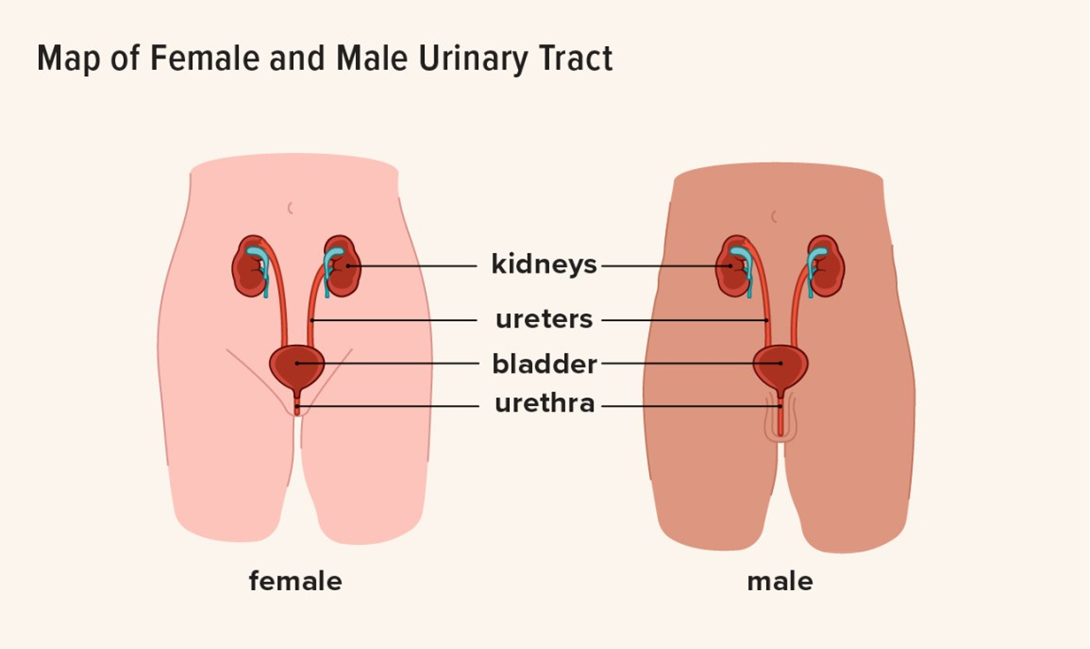A nurse is collecting data on an older adult client. Which of the following findings should indicate to the nurse that the client has a bladder infection?
Changed mental status
WBC count 9,000/mm³
Diminished reflexes
Temperature 37.3°C (99.1°F)
The Correct Answer is A
Choice A reason: Changed mental status, such as confusion, agitation, or delirium, can be a sign of a bladder infection in older adults, as they may not have the typical symptoms of dysuria, frequency, or urgency.
Choice B reason: WBC count 9,000/mm³ is within the normal range of 4,500 to 11,000/mm³ and does not indicate an infection.
Choice C reason: Diminished reflexes are not related to a bladder infection and may be due to aging, neurological disorders, or medication side effects.
Choice D reason: Temperature 37.3°C (99.1°F) is slightly elevated but not indicative of a bladder infection. Older adults may have lower baseline temperatures and may not develop fever in response to an infection.

Nursing Test Bank
Naxlex Comprehensive Predictor Exams
Related Questions
Correct Answer is D
Explanation
Choice A: This is incorrect. The client having difficulty reading large print indicates a need for an ophthalmology referral, not an occupational therapy referral. An ophthalmologist can assess and treat vision problems caused by stroke.
Choice B: This is incorrect. The client coughing while drinking from a straw indicates a need for a speech therapy referral, not an occupational therapy referral. A speech therapist can assess and treat swallowing problems caused by stroke.
Choice C: This is incorrect. The client being unable to bear her full weight while walking indicates a need for a physical therapy referral, not an occupational therapy referral. A physical therapist can assess and treat mobility problems caused by stroke.
Choice D: This is correct. The client becoming exhausted while brushing her teeth indicates a need for an occupational therapy referral. An occupational therapist can assess and treat functional problems caused by stroke, such as fatigue, self-care, cognition, and leisure activities.
Correct Answer is D
Explanation
Choice A: This is incorrect. The client having difficulty reading large print indicates a need for an ophthalmology referral, not an occupational therapy referral. An ophthalmologist can assess and treat vision problems caused by stroke.
Choice B: This is incorrect. The client coughing while drinking from a straw indicates a need for a speech therapy referral, not an occupational therapy referral. A speech therapist can assess and treat swallowing problems caused by stroke.
Choice C: This is incorrect. The client being unable to bear her full weight while walking indicates a need for a physical therapy referral, not an occupational therapy referral. A physical therapist can assess and treat mobility problems caused by stroke.
Choice D: This is correct. The client becoming exhausted after performing activities of daily living indicates a need for an occupational therapy referral. An occupational therapist can assess and treat functional problems caused by stroke, such as fatigue, self-care, cognition, and leisure activities.
Whether you are a student looking to ace your exams or a practicing nurse seeking to enhance your expertise , our nursing education contents will empower you with the confidence and competence to make a difference in the lives of patients and become a respected leader in the healthcare field.
Visit Naxlex, invest in your future and unlock endless possibilities with our unparalleled nursing education contents today
Report Wrong Answer on the Current Question
Do you disagree with the answer? If yes, what is your expected answer? Explain.
Kindly be descriptive with the issue you are facing.
